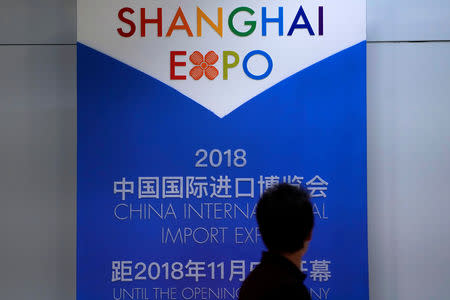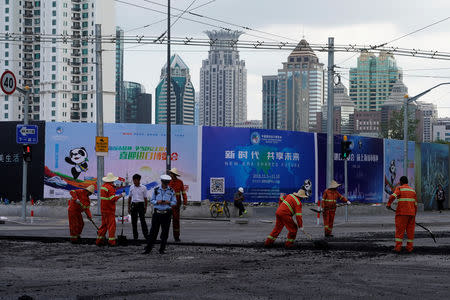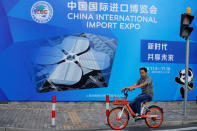China to show off its zeal to import but business awaits policies
By John Ruwitch
SHANGHAI (Reuters) - China will soon host a huge trade fair to highlight its commitment to free trade and show off its willingness to import, but sceptical foreign businesses and diplomats say they want to see concrete policy changes to improve market access.
The China International Import Expo, announced by President Xi Jinping in 2017, is aimed at calming mounting foreign concern about China's trade practices and to signal its willingness to narrow its trade gap with the United States and others.
Authorities have been pulling out all the stops to ensure the success of the Nov. 5-10 trade fair in Shanghai.
But with a China-U.S. trade dispute deepening, sources familiar with the planning of the expo say that while many U.S. companies will attend, Washington is not planning to send any officials, though they have been invited.
The U.S. embassy in China declined to comment.
The ultimate value of the event - beyond propaganda points for China - will hinge on whether the government unveils substantial new market-opening policies, some foreign business people say.
But there are few signs any are imminent.
The expo was a "broadly positive gesture" that China wants to increase imports, said Ken Jarrett, president of the American Chamber of Commerce in Shanghai.
"On the other hand, hurdles such as market access restrictions and non-tariff barriers continue to prevent companies from selling their products in China. Addressing those structural barriers are just as important, if not more so."
The expo, which will fill an exhibition hall bigger than 35 soccer pitches, is one of the most important events on China's diplomatic calendar this year, with foreign officials and executives due to attend.
The Commerce Ministry and Shanghai government established new departments to organise and run it, and a special dispute resolution tribunal has been set up.
Chinese embassy staff around the world and officials at home have spent months pressing foreign businesses and governments to participate, according to diplomats and businessmen.
Two senior Western diplomats, one in Shanghai and one in Beijing, said they had even been told of oblique threats, but declined to give specific details.
"Things like: 'You've got a great business here. It'd be a pity if something happened to it' ... We've heard this from many, many companies," said one.
Others in the diplomatic and foreign business communities said they were not aware of such tactics.
Several people who have attended planning briefings say the government has promised that state-owned enterprises (SOEs) and local government delegations would attend in force, ready to do deals.
"The SOEs have their marching orders to make big orders," the second senior diplomat familiar with the planning told Reuters.
The commerce ministry did not respond to a faxed request comment.
'OPPOSITE SIGNAL'
Few doubt that when the expo ends, China will point to import deals struck and declare it a success.
But that misses the point, said Scott Kennedy, a China trade expert at the Centre for Strategic and International Studies in Washington.
"If the purpose of this event is to suggest that China is more open, that it will import more and allow the market to function more independently, the steps that they are taking send the exact opposite signal," Kennedy said, referring to things like the pressing of companies to attend and of state enterprises to do deals.
"It is, again, reflective of how China and market economies talk past each other."
Some foreign businessmen say they will turn up out of a sense of obligation - not doing so could be imprudent.
"We'll be there because we have to," said an official at a U.S. tech company who declined to be identified because he was not authorised to speak to the media.
Foreign officials and businesses are keeping their expectations in check.
"If you were to ask the average European business what they want from China to boost imports, it would be a long-term, transparent and predictable schedule of market opening and a levelling of the playing field," said a senior European diplomat.
"It wouldn't be an enormous trade fair."
On trade policy, Xi's government has undertaken what Kennedy called "tinkering with specific market access opportunities within the context of deep and extensive, unchanging intervention".
That approach is unlikely to change.
Still, companies like Europe's biggest pork exporter, Danish Crown, will be there.
"Danish Crown is one of the very large exporters to China so we'll of course be there," said Soeren Tinggaard, vice president for Pork Export Strategy & Marketing.
"There will be signals from the government about 'how we're going to import more' and of course, we're going to be there to hear that."
(Additional reporting by Ben Blanchard, Dominique Patton and Michael Martina in BEIJING, and Noah Barkin in BERLIN; Editing by Robert Birsel)

 Yahoo Finance
Yahoo Finance 









